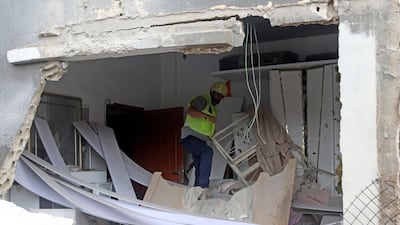Another war in Lebanon would “plunge the country into the dark ages”, caretaker Economy Minister Amin Salam told The National as cross-border exchanges stoke fears of a full-blown conflict with Israel.
Mr Salam was speaking after a cabinet meeting on Thursday to discuss Israel's heavy bombardment of the Gaza Strip, which he described as a “massacre”, in response to a deadly attack by Palestinian militant group Hamas.
The recent attacks along the southern border by Hezbollah, a powerful Iran-backed Lebanese militia and political party that supports Hamas, have fuelled fears that Lebanon may become a new front.
Israel has so far responded with shelling and air strikes that killed three Hezbollah members.
Mr Salam said there was consensus that the Lebanese state would have to retaliate in the event of a full-scale Israeli attack.
“We will not accept any invasion of Lebanon nor will we tolerate the possibility of Lebanon facing a fate and slaughter akin to that witnessed in Palestine,” he said.
Israel launched an invasion of Lebanon after Hezbollah attacks in 2006, leading to a month-long war that devastated civilian infrastructure and claimed more than 1,200 lives in Lebanon and at least 160 in Israel.
Mr Salam said a new escalation would come at a time when Lebanon is “already very vulnerable”, a reference to the acute economic crisis the country has been grappling with for four years, marked by shortages of fuel, medicines and basic goods.
“We cannot afford a war. We have bad infrastructure, no national reserves of food and medication,” Mr Salam said.
“We will pay a very heavy price, even with a small escalation in the south of the country.”
The 2006 conflict between Israel and Hezbollah – in pictures
Consensus on security
Mr Salam said that although there was agreement among cabinet members, including Hezbollah-affiliated ministers, against going to war, the government had a duty to defend the nation's borders and would consider taking action if the Israeli aggression escalated to a critical point.
“There is a consensus that Lebanon will not permit Israeli attacks and sit there watching. Nobody in Lebanon, be it the military, militias, or political parties, will accept such a scenario,” he said.
His comment suggested that the army might fight alongside Hezbollah in a new confrontation with Israel, unlike in 2006 when the fighting was between Hezbollah and Israel.
“The times are very different from 2006, with different challenges and stakes. What we're facing today threatens the very existence of Lebanon,” he said.
Lebanon's sectarian political landscape is broadly divided into pro and anti-Hezbollah camps.
But Mr Salam said the tension which usually shapes the public debate was not reflected in the cabinet's discussions on Thursday.
“All the political parties, including Hezbollah, are looking in the same direction,” he said.
The Shiite group has formidable military capability and is said to wield more power than the state itself.
Regarding the government's ability to control the militia's actions in the south, which many observers have describe as non-existent, Mr Salam said “Hezbollah is part of the government, and [their ministers] participated in the discussion, hearing all concerns relevant to their portfolios”.
He declined to comment on the actions of Hezbollah's ally Hamas.
“When I look at Palestine today, I see a dire humanitarian crisis,” he said. “I don’t like to interfere in the politics of parties that are not Lebanese parties”.
Emergency planning
Mr Salam said that the government discussed formulating an emergency plan should the situation escalate.
He said he had drawn up immediate measures to tackle food security concerns, given the lack of national grain and wheat reserves, while the Health Minister was developing a medical emergency plan.
“We are planning for the worst and hoping for the best,” he said.
The cabinet meeting included top security officers and army chief Joseph Aoun, who presented an assessment of the current situation.
“Based on his military experience, he did not see anything so far that will spark a full-fledged war in the south,” Mr Salam said.
The calculation could change in the coming days as Israel threatens a massive ground invasion of the Gaza Strip, which would be “very alarming”, he said.
“The country is at an existential intersection,” he said. “We don't want, as a small state, to be a bargaining chip in a larger geopolitical game. The only way forward is to stand up and declare that we will not be a weak link.”
































